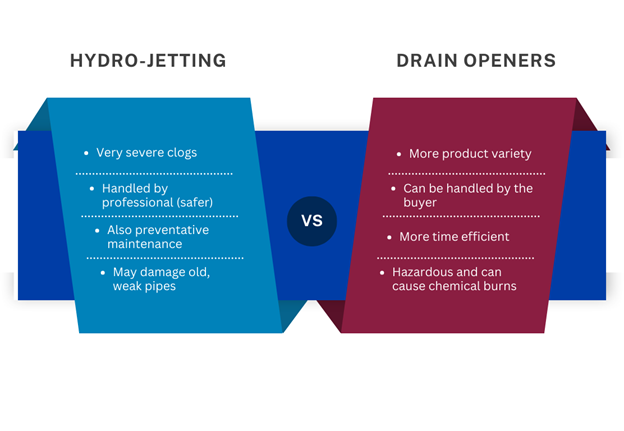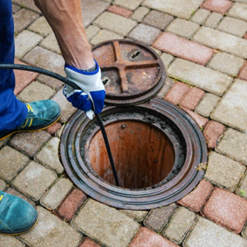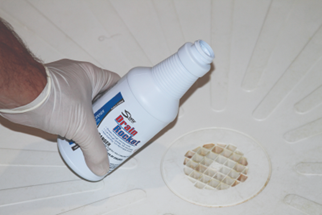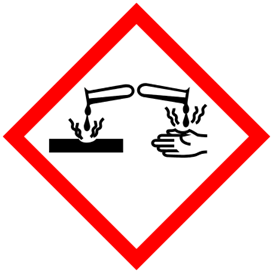Hydro-Jet Drain Cleaner vs. Chemical Drain Opener
Hydro-Jet Drain Cleaner vs. Chemical Drain Opener
What’s the most effective way to deal with clogs in your drain lines? How can you tell what will be the safest for your pipes? Is hydro-jetting worthwhile? Are drain openers better? With so many different options for so many different situations, it can be hard to find a straight answer on what’s best for your facility.
State Chemical is a chemical manufacturer that has been in business since 1911, and one of our main focuses is drain care. Every day, we talk with clients who have these same questions, so we know that it can be hard to know what to do when you’re faced with a pipe clog.
To help you make the right decision for your facility, we’ve compared hydro-jetting to chemical drain openers and considered which situations either option is best for. Once you’ve read this comparison, you’ll be ready to decide whether hydro-jetting or chemical drain openers are a better fit for your facility’s drain problems.
What is Hydro-Jetting?
Before we go into the pros and cons of hydro-jetting, what even is hydro-jetting?
Hydro-jetting, also known as sewer jetting, is a way of unclogging drains where a plumber will stick a high-pressure hose down your pipes. It works a lot like a power washer, intensely shooting water through any gunk such as fats, oils, and greases (FOGs), organics, or other blockages. This process loosens and breaks up the clog into smaller pieces that can more easily pass through your pipes.
Hydro-jetting is so powerful that it can even break through tree roots, though this is not advised as tree roots in your pipes often indicate larger issues that must be addressed.
Pros and Cons of Hydro-Jetting
There are benefits as well as drawbacks to the hydro-jetting process. What works best for you will depend on your facility’s specific situation.
Pro: Hydro-Jetting is Effective for More Severe Clogs, Such as in the Main Line
One of the main merits of hydro-jetting is its effectiveness. Hydro-jetting is so effective that it can be the last solution before pipe replacement.
With very severe and/or deep clogs, such as in your main line, it’s hard for tools like a drain snake to reach the clog, much less break it up effectively. Even for chemical drain openers, sometimes a clog is thick enough that it’s impossible to burn through.
Before you replace your pipes, a costly and time-consuming endeavor, it may be worthwhile to try hydro-jetting. Since it shoots water at such a high pressure, hydro-jetting can get through most materials where other methods may fail. There are no guarantees it will work in every situation, but it’s worth exploring if your clog is bad enough.
Con: Hydro-Jetting Must Be Done by a Plumber and is More Time Consuming
A major downside of hydro-jetting is that you cannot do it yourself. To properly have your lines hydro-jetted, it’s important to call a plumber to complete the service, or you may be putting yourself at risk as an untrained user.
Plumbers are typically expensive and time-consuming, which also means you will lose business while this work is getting done. If your only option is hydro-jetting, it is what it is. But if you have a choice and time and labor expenses are important to you, it’s better to try a chemical drain opener.
Pro: Hydro-Jetting is Usually Safer than Using a Chemical Drain Opener
While hydro-jetting must be done by a professional, it tends to be safer than a chemical drain opener. With chemicals, your facility’s staff will need to handle them and pour them down your drain. If inappropriately used, this can put them at risk of bodily harm.
Meanwhile, hydro-jetting only involves water, so it can’t cause chemical burns. It will be even less risky to your staff when properly handled by a trained professional.
Con: Hydro-Jetting May Damage Old, Weak Pipes, Especially If Managed Inappropriately
Hydro-jetting is powerful—and this can be a problem when you’re working with old or weaker pipes (typically those installed before 1980).
When there is damage to the pipe (such as corrosion) or its waterproof coating, the jets can dislodge parts of the pipes or cause other debris to enter the lines. This will cause larger issues than a clog, and you may even need to replace the pipes.
If you use a professional for these services, they should survey the pipes beforehand so this doesn’t happen, but it is still a dangerous possibility for older drain lines.
Pro: Hydro-Jetting Can Also Be Used as Preventative Maintenance
When used appropriately, hydro-jetting is so effective at clearing drain lines that it not only removes clogs but cleans the pipes. With hydro-jetting, your pipes can go longer between cleanings than they would if you snaked your drains, for example. Because it cleans the lines all the way through, it’s a great option for removing other buildup along with your clog.
What is a Chemical Drain Opener?
Meanwhile, a chemical drain opener is a bottle of either liquid or granular chemicals that you can pour down your drain to clear out a clog.
Depending on whether you use an acid or a heat-generating drain opener, pouring the product down your drain will cause a chemical reaction that pushes out or dissolves FOGs, organics, and other blockages. This allows them to pass through your drain easily, and your facility can continue business as usual.
Pros and Cons of Chemical Drain Openers
As with hydro-jetting, there are both pros and cons to chemical drain openers, which are important to consider so that you make the right purchase for your facility.
Pro: Chemical Drain Openers are Effective for a Variety of Clogs
A helpful quality of chemical drain openers is that there are various product options.
There are liquid drain openers and granular drain openers. There are acid options as well as caustic options. Whatever your issue or preference, there’s likely a drain opener for you.
And with varying options are varying applications. For more mild-to-standard clogs, you can use a heat-generating caustic to clear out your issue. Meanwhile, for more severe clogs, such as those caused by bedsheets, you can use acids that will burn through virtually anything.
If you value variety or have a unique issue, drain openers are the solution for you.
Con: Chemical Drain Openers are Hazardous
While noting the pros and cons, it’s important to recognize that chemical drain openers are hazardous to handle and can even be harmful to your pipes if you use the wrong chemicals on the wrong pipes.
If you're worried about safety, you don’t necessarily need to avoid chemical drain openers altogether, but you do need to be sure that you can educate your staff on proper usage before investing in one. Acids can cause severe injuries, while even heat-generating chemicals can cause chemical burns.
It’s important to wear personal protective equipment (PPE) while handling any hazardous chemicals. If you’re worried about safety and would rather have these concerns in the hands of a professional, hydro-jetting may be a better option for your facility.
Pro: Chemical Drain Openers Can Be Handled by the Buyer and are Time Efficient
However, on the other side of the coin, if you prefer to handle your drain opener yourself in order to save time, chemical drain openers are for you.
When you buy a bottle of a drain opener, you can easily pour it down your drain and let it do the work itself. The entire process should only take around 15 minutes.
Meanwhile, hydro-jetting is a much bigger production because you must call and schedule a time with a plumber, shut down your facility while they’re working, and pay them for their hours of work. This can create a larger inconvenience than chemical drain openers would, so if you’d like to be more time efficient and finish the job yourself, chemical drain openers are the right choice for you.
Con: Chemical Drain Openers Must Be Used Infrequently
Another important safety note is that unlike with hydro-jetting, chemical drain openers should not be frequently used.
With consistent usage, chemical drain openers can wear down pipes as well as create more of a risk to the user. If you keep using a hazardous chemical again and again, you’re exposing your staff to it more frequently, risking injuries. Additionally, suppose the staff mistakenly uses a manual drain opener, such as a drain snake, after using a chemical drain opener. In that case, they’ll pull remnants of that hazardous chemical up the drain with the blockage.
Meanwhile, hydro-jetting is just water, so it can be consistently used with no damage to your pipes or staff as long as it is properly used and your pipes were installed after 1980.
Your Next Step: Pick Hydro-Jetting if You Prefer Chemical-Free Cleanings by Professionals. Go with a Chemical Drain Opener if You’d Rather a More Time-Efficient Solution You Can Do Yourself
When you have a drain clog, you want effective solutions as quickly as possible. Now that you know the benefits and drawbacks of hydro-jetting as compared to chemical drain openers, you’re prepared to explore which State Chemical drain opener will best unclog your drain.












